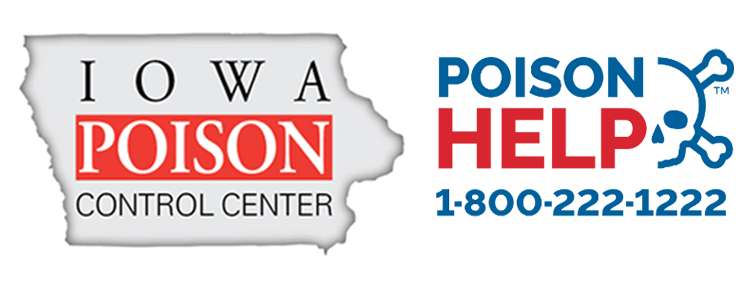
For Poisoning Questions or Emergencies, Call the Poison Experts at 1-800-222-1222
The Hidden Hazards of Holiday Cooking: Staying Safe in the Kitchen this Festive Season

Holiday season – a time of joy, celebration and undoubtedly, plenty of cooking and baking. From traditional roasts and festive cookies to extravagant desserts, the kitchen becomes the heart of our homes more than ever. However, amidst the culinary adventures, it's essential to stay aware of potential poison hazards. The Iowa Poison Control Center (IPCC) is committed to ensuring your holiday season is filled with delicious memories, not unexpected mishaps.
- Raw and Improperly Cooked Foods
Holiday meals often involve dishes that we don't cook regularly, which can lead to unfamiliar risks. Consuming raw or undercooked meat, poultry, seafood, or eggs can lead to foodborne illnesses like Salmonella or E. coli infections. Be sure to thoroughly cook all dishes, and use a food thermometer when preparing meats to ensure they've reached a safe internal temperature.
It's also tempting to taste-test cookie dough or cake batter, but remember that uncooked eggs and flour can pose a risk of Salmonella and E. coli, respectively. It's safer to wait until those cookies are freshly baked and that cake is out of the oven.
- Safe Storage and Handling of Ingredients
Storing and handling your cooking ingredients safely is another key aspect of kitchen safety. Keep potentially hazardous substances, like certain spices or alcohol-based extracts, out of the reach of children. Also, ensure that food is stored at the correct temperatures to prevent bacteria growth.
- Kitchen Tools and Appliance Risks
The holiday rush can sometimes lead to carelessness with kitchen tools and appliances. Always exercise caution when using sharp knives, electric mixers, or other kitchen tools that can cause injuries if misused. Additionally, be aware of potential poisoning hazards. Non-stick cookware, for example, can release toxic fumes if overheated. Always use such items according to the manufacturer's instructions.
- Decorative Food Items and Additives
Decorative food items or additives can enhance the festive look of your dishes, but some may pose a risk if ingested in large quantities. Certain food colorings, for instance, can cause allergic reactions in some individuals. Keep track of any such additions you make to your meals, especially if you'll be serving guests who might have food allergies or sensitivities.
Reacting to a Poisoning Incident
Despite our best efforts, accidents can happen. If you suspect a poisoning incident in your kitchen – whether it's ingestion of a harmful substance or exposure to a harmful material – it's important to respond promptly and correctly. First, try to stay calm. Then, call the IPCC at 1-800-222-1222. Our poison specialists are available 24/7, ready to provide free, expert advice.
The Role of IPCC
IPCC plays a crucial role in maintaining public safety within the state of Iowa. Its importance becomes particularly evident during the holiday season when there can be an increase in potential poisoning incidents related to food preparation and consumption.
As an emergency hotline for individuals facing potential poisoning situations, IPCC provides immediate, expert assistance around the clock. This is especially relevant when people are experimenting with new recipes or using unfamiliar ingredients, situations that can unknowingly introduce risks. Whether it's an accidental ingestion of a toxic substance, an overdose, or a food-related poisoning, IPCC is equipped to offer advice and help mitigate the situation.
Beyond emergency responses, IPCC serves as an educational hub, aiming to proactively reduce poison-related incidents. The center offers public education programs to raise awareness about common household risks. This includes guidance on safely managing potential hazards that may arise during festive holiday activities.
IPCC is also instrumental in collecting and analyzing data related to poisoning incidents. This invaluable data guides public health policies, influences regulatory actions and aids in the development of preventive strategies, Remember, the services of IPCC are not just limited to the residents of Iowa. The center is part of a nationwide network of poison control centers and can provide assistance to callers from anywhere in the United States.
IPCC is not just an emergency hotline but a comprehensive resource dedicated to preventing and managing poisoning incidents. It is a crucial component of the public health infrastructure, working tirelessly to ensure poison safety for all.
The holiday season is a time to create joyful memories with loved ones, and food often plays a central role in these special moments. By being aware of potential kitchen hazards and practicing safe cooking habits, you can ensure that your holiday meals are not just delicious, but safe as well. Remember, if you're ever in doubt about a potential poison hazard, IPCC is just a phone call away. Here's to a safe, joyful and delicious holiday season!
